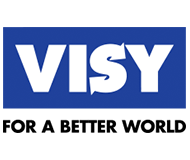Visy
Home » Resources » Case Studies » Visy

Business objective
Visy was facing a number of issues around the management of incoming Invoices within the company’s accounts payable department. Every month Visy received around 35,000 Purchase Order Invoices and Statements from more than 10,000 vendors manually and this needed to be automated to reduce effort, cost and complexity.
Business benefits
Through the use of the B2BE solutions for their accounts payable document automation project Visy realised positive results through cost reductions and business processes efficiencies.
B2BE solutions
Visy see positive results using accounts payable document automation solution
Visy began manufacturing corrugated cardboard boxes in Melbourne, Australia, in 1948 and has grown to become one of the world’s leading privately owned packaging, paper and recycling companies. Visy’s past, present and future are linked by a commitment to growth, through meeting the customers’ needs and the wise use and re-use of scarce resources. Visy’s success depends on carefully balancing economic, environmental and social factors. Being truly sustainable is a journey of continuous improvement, learning and adaptation.
The company employs around 5,600 people operating from over 100 sites and generates more than $2.3 billion in revenue. Through its products and services the company serves various sectors including pharmaceutical, construction, dairy, fast-moving consumer goods, automotive, and building industries in Australia, New Zealand, Asia, Europe, Africa, and the United States.
The challenge
Richard Xuereb, Visy Corporate National Manager Shared Services Payable Division for Visy was facing a number of issues around the management of incoming Invoices within the company’s accounts payable department. Every month Visy received around 35,000 Purchase Order and financial Invoices and statements from more than 10,000 vendors and partners in hardcopy and other receipt mechanisms; facsimile or email attachment. The Invoice information in the documents all had to be manually processed and delivered into a customised workflow approval system called IXOS. Within IXOS the authorisation and archiving of Invoices takes place before accounts payable information is migrated to Visy’s back office system SAP.

A staff of 32 people was responsible for this labour intensive, manual document processing that also meant a lot of paper shuffling within the organisation, missing documents and errors in data keying which was coupled with slower processing for supplier Invoices which also increased supplier queries and responses.
In order to reduce cost, eliminate the risks of errors and to create a more efficient and faster document handling process Richard decided to search for a solution that could automate Visy’s accounts payable document handling and significantly reduce the manual indexing component.
Richard had a few good reasons to choose B2BE as being the partner ‘who could, through past achievements, achieve the desired outcome’. Richard having years of process improvement experience in Australia and the UK, coupled with a working knowledge of B2BE’s abilities to deliver tailor made solutions that are designed to produce a return on investment through document process improvements.
Coupled with Visy’s requirements and B2BE’s ability to deliver Richard’s requirements B2BE’s outsourcing model meant no upfront investment costs and therefore a very attractive ROI model.


The solution
The B2BE solution for accounts payable automation consists of the joint deployment of the following B2BE products:
- B2BE EDI
- B2BE Document Digitization Service
Within the B2BE solution for Visy all scanned accounts payable documents received by email, facsimile and hard copy are transmitted to the B2BE server. Subsequently B2BE executes a number of added value services for Visy. Through the deployment of the B2BE Document Digitization Services, Invoices and Statements are digitised according to the key fields required to enable the upload into the Visy IXOS and ultimately the Visy SAP system for processing based on the supplier terms which also meet local tax authority requirements.
Furthermore, validation is done on Invoice type, vendor, site contact name and duplication in order to eliminate (data) errors. In the next step all Invoices and statements are converted into an electronic format, placed into directories based on document type for further processing into Visy’s system.
B2BE also provide a range of business intelligent reporting to enable Visy to pro-actively manage the flow of data and documents between the Visy and B2BE environments and which provide error notifications and reporting to manage exception handling based on the pre-defined business validation rules B2BE applies on Visy’s behalf.
The result
Through the use of the B2BE solutions for the accounts payable document automation project Visy realised positive results through cost reductions and business processes efficiencies which could be quantified as follows:
- The cost reduction for Invoice and Statement handling and management within accounts payable could be reduced by not less than 80%;
- Increased efficiencies which led to faster document handling process;
- Turnaround time for document indexing could be brought back to a maximum 24 hours after document receipt;
- Elimination of data entry errors. For example, keying of wrong amounts, Invoice numbers, tax details etc.;
- Elimination of duplicate Invoices processing;
- Vendors are made more accountable through early error detection via the B2BE validation processes, which reduced work effort;
- Increased level of data accuracy because of validation.

Through these results, accounts payable personnel could be redeployed within the organisation to perform more added value tasks. According to Richard Xuereb: ‘The B2BE solution helped Visy in restructuring the accounts payable document processing activities and enormously boost business responsiveness, enhance transparency, increase cost savings and efficiencies, and most importantly deliver the vital information to our decision makers within the organisation’.
The next steps for Visy will be to start exchanging documents with a growing group of suppliers by EDI instead of e-mail, fax or hard copy. In this way the process can be completely automated on both ends in the supply chain so that not only Visy, but also their suppliers and partners can benefit from future cost reductions and business process improvement.